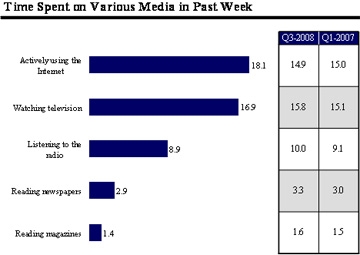
| Vol 2, #12, March 23, 2010 |
|
March 23 , 2010 Weekly Internet usage overtakes television watching according to Ipsos Reid poll Ipsos reports that for the first time ever in their tracking research, the weekly Internet usage of online Canadians has moved ahead of the number of hours spent watching television. This latest finding comes from the Inter@ctive Reid Report, a syndicated Ipsos Reid study that tracks online Canadians usage of the Internet. Overall, online Canadians are now spending more than 18 hours a week online, compared to 16.9 hours watching television. Internet usage is up from 14.9 hours last year. The number of hours watching television also experienced an increase in the last year, rising from 15.8 hours. Other media, such as newspapers, radio and magazines have all remained relatively stable in the last year.
Interestingly, males are spending significantly more time online than females (20 hours compared to 16). Also of interest is the minimal gap between age groups - on average, 18-34 year olds are spending 20 hours a week online, compared to 18 hours for those over the age of 35. “In previous years we’ve seen significant differences between the generations and the amount of time they spend online,” notes study author Mark Laver, “The data indicates that not only are people of all ages spending more and more time online, but it also points to a shift in how online Canadians are consuming media and where they are spending their free time. Today, online Canadians are finding a myriad of entertainment options available to them within the walls of their homes. While some entertainment content has simply shifted from television to online, the Internet is also providing new content to Canadians.” Television, on the other hand is different. Canadian adults aged 55+ are significantly more likely to be watching more television each week (20 hours of television each week compared to 15 hours for those aged 35-54 and 13 hours for those aged 18-34). Those with university educations watch significantly less television each week - 15 hours, compared to approximately 17.5 hours for those without university educations. Laver continues: “Our look at online television and media in the Inter@ctive Reid Report shows that Canadians are consuming more and more content online than they were previously watching on television or content that they simply did not have access to. Not only has the recession likely acted as a disrupting factor, but the Internet is poised to take the next step in our lives as it delivers more and more entertainment content to Canadians in their homes and on the go.” This release is based on the findings of an Ipsos Reid syndicated study, the Inter@ctive Reid Report, fielded in Q4, 2009. This online survey of 839 Canadian adults was conducted via the Ipsos Online Panel. The results are based on a sample where quota sampling and weighting are employed to balance demographics and ensure that the sample's composition reflects that of the actual Canadian population according to Census data. Quota samples with weighting from the Ipsos online panel provide results that are intended to approximate a probability sample. An unweighted probability sample of this size, with a 100% response rate, would have an estimated margin of error of +/- 3.38 percentage points, 19 times out of 20. |
Contact Us For rates, opportunities, media partnerships, or to other information please contact our media sales department. {p: 905-201-6600} {t: 1-800-668-1838} Mark Henry Sales Manager, x 224 Peter O'Desse Senior Account Manager, x 223 Steve Lloyd, Publisher, x 225 Amy Bostock, Editor, x 221 |
